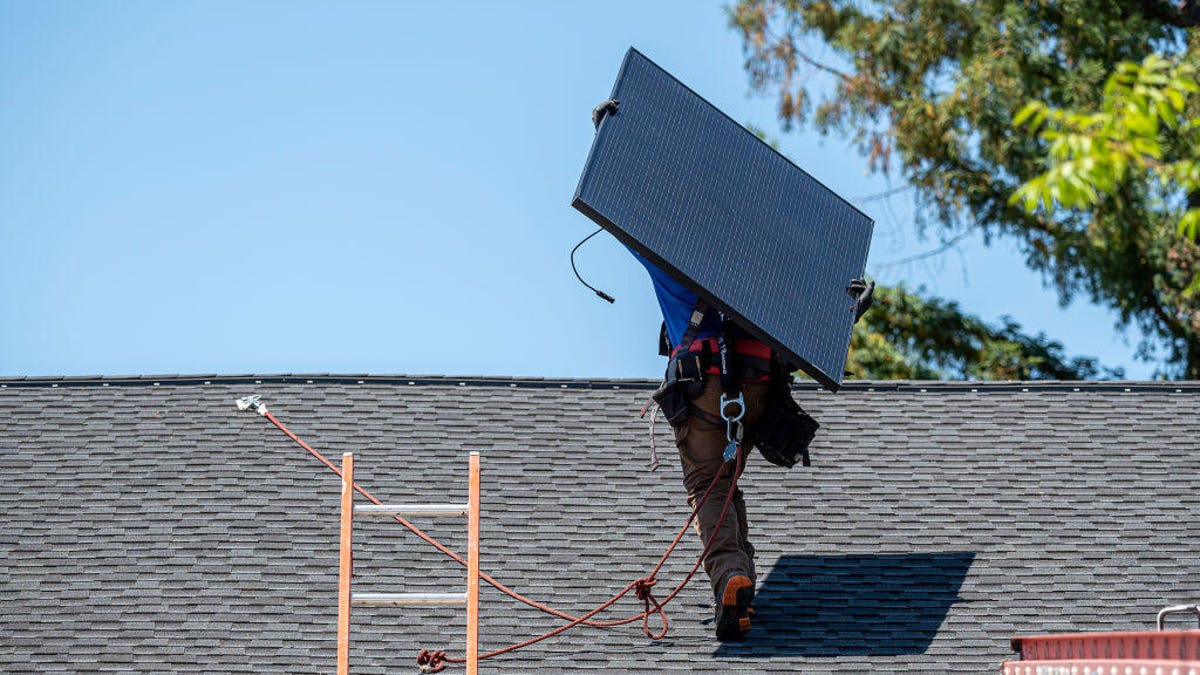High Interest Rates Are Making Solar Leases More Appealing
The cost of borrowing money is higher now due to the Fed's rate hikes. Homeowners and solar companies are looking at other payment models.

The residential solar industry grew quickly in 2022, but has slowed down a bit. High inflation and interest rates are largely to blame, experts say.
If you're in the market for solar panels, a lot of economic and political factors are in your favor. One big one is not, however: interest rates.
As a result, it often makes more sense right now for someone else -- a solar company -- to own the panels you get put on your rooftop.
Last year was a record year for home solar panel installations, with 40% growth in the industry, according to Zoe Gaston, principal analyst for US distributed solar at the consulting firm Wood Mackenzie. That growth was fueled by the Inflation Reduction Act, which gives you a 30% tax credit on the cost of a solar panel installation if you buy the system outright or borrow money for it with a solar loan.
Can solar panels save you money?
Interested in understanding the impact solar can have on your home? Enter some basic information below, and we’ll instantly provide a free estimate of your energy savings.
"Last year was a huge year for the loan market," Gaston told CNET. "This year is a little bit of a different story."
How interest rates affect solar panel financing
Interest rates for all kinds of debt have been on the rise since 2022, when inflation took off in the wake of the COVID pandemic's economic upheaval. In response to that inflation, the Federal Reserve started to jack up the federal funds rate -- a benchmark interest rate that affects how much it costs banks to borrow money. Those hikes have trickled down to other forms of consumer borrowing, like the loans you would get to buy solar panels.
"Financing costs, because of high interest rates, have been a big issue," Gaston said.
As a result, more homeowners are getting solar panels with a lease or power purchase agreement rather than buying them outright. Solar installation companies are emphasizing their lease and PPA offerings in the hopes of attracting buyers who want to avoid high interest rates and save more money up front.
"It is in direct response to how fast and how sharply interest rates have gone up," said Jason Conrad, senior vice president of Palmetto, a solar installation and tech company that recently started offering leases and PPAs through a program it calls LightReach. "The consumer value proposition on buying solar through a loan is really impacted by higher interest rates."
How are solar loans different from leases and PPAs?
The difference is pretty simple, but it's significant.
When you buy solar panels, you use cash or a loan to purchase the equipment and pay for the installation. You then get to take advantage of that 30% tax credit from the federal government, and any electricity those solar panels generate is yours to keep and use or to sell to the grid.
You own the equipment, meaning you're responsible for the maintenance. And you won't really see net savings overall until after the equipment has paid for itself -- typically several years down the line.
With a lease, you pay a company a monthly payment to put the solar panels on your house and you get the use of the electricity. A PPA is somewhat different, in that you pay the solar company for the kilowatt-hours of energy you use. In either case, the solar system isn't yours, and the company gets the tax credit, rather than you.
One advantage: You might save money on your bill starting out immediately, because all you'll be paying is a monthly or per-kilowatt-hour fee.
Leases and PPAs also make sense for anyone who might have a limited tax liability at the end of the year. If you have a lower or fixed income, you may not pay enough in federal taxes to make the 30% tax credit worthwhile, Conrad said. Because the credit only reduces your tax liability (it isn't refundable), you'll need to owe at least a couple of thousand dollars in federal taxes each year to get the full advantage of the credit.



